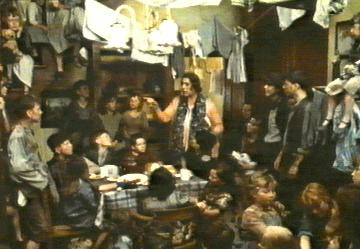Linda made a comment this morning that somewhat shocked me: "For the last few months, Liv has been off of all prescription medications she'd been on since 2004"! We have fought to loosen bowels then fought to solidify them; fought with reflux, vomiting, inflammation as well as pain and supposed allergies. She's been on Xantac, Singulair, Miralax, then Sulfasalizine, Pentasa, Prilosec (note: correct spellings on pharmaceutically-invented names has never been my forte nor priority). We have run the gamut to try and help her with her gastrointestinal issues
Today, she has had far fewer night wakings, better moods, quicker cognitive processing time. Most of her bowel movements have been regular; if temporarily blocked, instead of a 'prescription', we are instead using slightly larger doses of magnesium than her normal daily dose and she is clearing up.
Yea, I could attribute all of this improvement to growing out of the 'gut' phase; yea yea 'no epidemiological study has found a connection togatroinblahblahblah'. As always, my problem with epidemiological studies of autism is using the whole of the group to study and dispute specific issues. If entire set A is not caused by or have symptoms of thing B then the broad relationship is disproven, but the specific issue for specific subsets remain. Kinda like trying to find out what causes cancer by looking at the whole 'cancer' group. Autism is complex (IMHO, of course) and no simple solution nor symptoms exist. It could also be that the stress of being non-communicative is causing some GI issues. Anything except what we are doing could be the thing that could be helping her.
In other words, my belief in the vitamins/minerals helping her GI issues (according to some people) I am the same as a baseball player with a hitting streak with very dirty and smelly socks because I have not changed them for fear of breaking the luck. Problem I see is that much of what we are doing is not irrational bead-counting, it's common sense nutrition. It's more like the extra batting practice or a new stance in the batters box, more science than superstition. Ooooh, baseball's coming soon! Not a fan per se; more a fan of the IDEA of baseball, a la Field of Dreams, the Natural or Bull Durham.
I won't get into conspiracy theories that state that big pharma will bury 'home remedies' in order to push their own, study-backed, and infinitely more profitable versions of 'cures'. Nor will I rail further on the hypocrisy of for-profit companies controlling what and how 'cures' are brought forth and are judged more on how much they will make than how much they will help. Sorry... I got into it and railed...
I guess the difference in our maturity in this quest to help Liv is just that. We are no longer trying or doing things to 'cure' her of autism. We are doing things to help her mood, to better concentrate, to make her feel more comfortable so she can help herself.
Trying existing pharmacologicals, natural or otherwise, to solve problems either not covered by specific prescriptions/therapies or inadequately covered by them. That's how I would define our involvement in biomedical interventions at this point. I'm surprised how many of those you would not suspect, are really closet 'biomed' parents as well.
Sunday, March 11, 2007
Subscribe to:
Post Comments (Atom)

3 comments:
Hi Bill
We have dealt with a lot of gastrointestinal issues last 3 years, also- the last one a very bad yeast flare-up.
Thank you for sharing this.
María Luján
www.searchingequilibrium.blogspot.com
I am very glad that we have you on 'our side' Maria! I always find your viewpoints knowledgeable, guardedly optimistic toward biomedical treatments and your discussions scientifically and logically sound.
The GI issues our kids face need to be investigated further than just writing a prescription...
Thank you for stopping by...
Bill
Bill,
You might be interested in this study on iron deficiency in autism.
Pediatr Neurol. 2007 Mar;36(3):152-8. Links
Children with autism: effect of iron supplementation on sleep and
ferritin.
* Dosman CF,
* Brian JA,
* Drmic IE,
* Senthilselvan A,
* Harford MM,
* Smith RW,
* Sharieff W,
* Zlotkin SH,
* Moldofsky H,
* Roberts SW.
Developmental-Behavioral Pediatrics, Glenrose Rehabilitation
Hospital, Department of Pediatrics, University of Alberta, Edmonton,
Alberta, Canada.
To determine if there is a relationship between low serum ferritin
and sleep disturbance in children with autism spectrum disorder, an
8-week open-label treatment trial with oral iron supplementation was
conducted as a pilot study. At baseline and posttreatment visits,
parents completed a Sleep Disturbance Scale for Children and a Food
Record. Blood samples were obtained. Thirty-three children completed
the study. Seventy-seven percent had restless sleep at baseline, which
improved significantly with iron therapy, suggesting a relationship
between sleep disturbance and iron deficiency in children with autism
spectrum disorder. Sixty-nine percent of preschoolers and 35% of
school-aged children had insufficient dietary iron intake. Mean
ferritin increased significantly (16 mug/L to 29 mug/L), as did mean
corpuscular volume and hemoglobin, suggesting that low ferritin in
this patient group resulted from insufficient iron intake. Similar
prevalence of low ferritin at school age as preschool age indicates
that children with autism spectrum disorder require ongoing screening
for iron deficiency.
Post a Comment